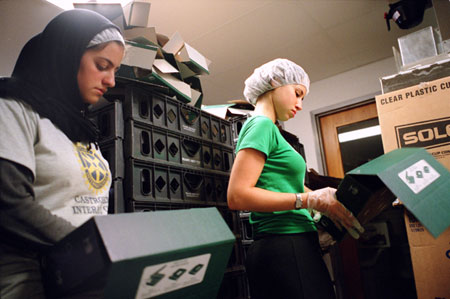Cooking up help for the hungry

To the Cabot, Currier, and Pforzheimer House residents who enjoyed its sauces, stews, and other concoctions, it was just a giant kettle, an anonymous player in their daily dining.
To Nancy Jamison, it’s a bubbling cauldron from heaven.
“You can put six 50-pound cases of plum tomatoes in here and it cooks them in 10 minutes,” said Jamison, director of the Boston nonprofit Fair Foods, admiring the stainless-steel kettle. “Do you know how good this is for us?”
Jamison, whose organization recovers surplus food and distributes it to shelters, soup kitchens, and poor people throughout the Boston area, is ecstatic that she just received not one but two wondrous steam kettles, complete with handles to dispense their contents and faucets to facilitate cleanup.
She’s also the proud owner of an 80-quart bread mixer. A convection oven. Stainless-steel work tables, warming ovens, and a buffalo chopper (more likely to dice onions than buffalo). Enough industrial-sized percolators to caffeinate most of Boston’s homeless men and women.
In all, Jamison’s Fair Foods hauled six truckloads of industrial kitchen equipment away from the Radcliffe Quad in June, all of it donated by Harvard.
Harvard’s surplus, Fair Foods’ treasure
Fair Foods’ treasure was Harvard University Dining Services’ (HUDS) trash, the byproduct of the renovation of the Quad’s dining facilities this summer. HUDS, which is in the middle of a multiyear renovation of all the house kitchens and dining areas, regularly contacts local shelters to donate food as well as equipment.
“Most of what we get rid of is equipment that has become outdated for our needs,” said HUDS director Ted Mayer. The energy savings of new equipment alone, he added, makes a compelling case for starting fresh. All of the Quad equipment was replaced; some was moved to other dining facilities on campus, but the bulk of it was no longer needed.
“It’s like keeping together a used car,” Mayer said. “At some point you make the decision to scrap it and purchase a new one but someone else can use the used car who is willing to invest the time or the sweat equity to get it going.”
With a limited time window for renovations – from the day after Commencement until the first meal was served to returning students in September – Mayer had to find takers quickly for his castoffs. He and recycling champion Rob Gogan, waste manager for Harvard’s Facilities Maintenance Operations (FMO), contacted charities that might benefit from a few steam tables or dishwashers.
With construction deadlines looming and worthy organizations slowly claiming equipment piece by piece, Mayer and Gogan made plans to haul the bulk of it to FMO’s facility in Allston, where it could be distributed throughout the summer.
Most of the items never made it to Allston.
Waste not, want not
Gogan had contacted Jamison, hoping that Fair Foods could tap its extensive network of soup kitchens and homeless shelters to help disburse Harvard’s hand-me-downs. Although she came to the Quad with a short shopping list, planning to score a few warming ovens to help preserve the English muffins she regularly receives from a regional bakery, Jamison left with almost everything in the kitchen.
“Fair Foods did definitely get the lion’s share of it,” said Gogan. “We feel good about that, that it was put to good use.”
Jamison is a determined, scrappy recycler whose work ethic is ruled by “waste not, want not.” When she arrived at the Quad to collect her booty, Harvard’s movers had already loaded the equipment she wanted onto trucks en route to Allston. She stuck a murky deal with the movers – food and several cases of beer were involved – and persuaded them to drive the goods straight to Fair Foods’ warehouse in Dorchester. The next day, Fair Foods’ lot shimmered with stainless steel and empty beer cans.
Fair Foods has been parceling Harvard’s goods out across the city; Community Servings, St. Francis House, and Metropolitan Baptist Church in Dorchester are among the recipients.
“It was so much fun to give away,” said Jamison.
Some of it, including one of the coveted kettles, went to the Jamaica Plain kitchen of Amir’s Catering, a Middle Eastern caterer and food wholesaler. When owner Amir Sedhom closes his operation for the day, he opens his doors to Fair Foods, which uses the kitchen to process some of the massive quantities of food they receive.
“There are times when we get an item, maybe a pallet of cabbage, but if you can’t chop it up, the shelters can’t use it,” said Jamison. Working out of Sedhom’s kitchen, Fair Foods will use the kettles to turn almost-spent fruits and vegetables into sauces and preserves and the bread mixer for fresh bread the organization sells to raise money.
‘A blessing to us’
Fair Foods is no stranger to Harvard’s generosity; the organization regularly gets food, equipment, and labor from the University. In early September, a team of students from Harvard’s First-Year Urban Program (FUP) filled Sedhom’s kitchen with chatter. Beside the tower of gourmet bread mix they were slowly preparing for baking, Nura Hossainzadeh ’06 and Ayelet Lebovicz ’06 got to know each other while lending a helping hand.
“Community service has been a big part of my life,” said another “FUPpie,” ChiChi Hsieh ’06, from Chandler, Ariz. “It’s been a great chance to meet our fellow freshmen.”
Still, the volume and value of this donation was unique for both Harvard and Fair Foods.
“This is a win-win situation,” said HUDS’ Mayer, who now oversees brand-new kitchens at the Quad and is pleased that the old equipment has found new life.
“Your equipment was a blessing to us. It’s going to enable us to do more,” said Jamison. “It’s been a great opportunity for a lot of people.”




